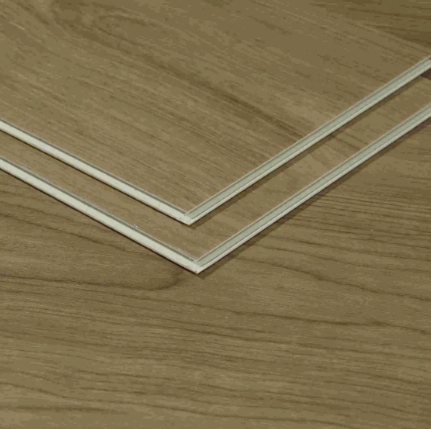Core Composition and Density in SPC Flooring
Stone Plastic Composite (SPC) Core Materials
SPC stands for Stone Plastic Composite, and it combines crushed limestone with PVC resin to make the main part of the flooring. What makes this mix so good? Well, it creates a core that's both strong and can bend a bit when needed, which gives SPC flooring all its great qualities. The material stays stable over time, blocks noise pretty well between floors, and doesn't get damaged by water like many other floors do. Because of these features, SPC works great everywhere from small apartments where people want something easy to maintain, right through to big office buildings with heavy foot traffic. Some tests have shown that this particular mix of ingredients helps prevent the floor from bending out of shape, something that happens quite often with regular wooden floors. When manufacturers pick quality core materials similar to what's used in SPC products, they generally see longer lasting floors that perform better under normal conditions.
Why Density Matters: 2000 kg/m³ Benchmark
When it comes to SPC flooring, density matters a lot. Most experts agree that around 2000 kg per cubic meter is what we should be looking at if we want something that lasts and holds up well over time. Floors with higher density just tend to handle impacts better and don't let sounds travel through as much, so people actually enjoy quieter spaces when walking on them. Studies have shown time and again that flooring meeting this density standard simply lasts longer than those made with less dense materials during all sorts of wear tests. What's more, these denser floors bounce back faster after getting stepped on repeatedly, which makes them great for busy spots like hallways or commercial kitchens where lots of people walk throughout the day. Getting SPC flooring that hits this density mark really does make a difference in how long it will last and how well it performs under normal conditions.
Assessing Wear Layer Thickness and Performance
Understanding wear layer thickness is essential when selecting SPC flooring, whether for residential or commercial use. It impacts durability, resistance to scratches, and overall longevity.
Residential Use: Optimal 0.3mm Wear Layer
In home environments, SPC flooring with around 0.3mm wear layer offers pretty good protection while still feeling comfortable underfoot. The layer is thick enough to handle regular walking around the house and those little accidents that happen daily, which makes it work well for most households. People who install this type of flooring generally find they get both comfort and lasting performance. Manufacturers claim their products with this wear layer thickness typically hold up for about 15 years in normal home use situations. For most families looking at flooring options, this combination of reasonable price and solid lifespan tends to fit what they need right now.
Light Commercial Requirements: 0.5mm+ Durability
For places that see regular foot traffic but aren't industrial grade operations, we need something sturdier than residential flooring options. The general rule of thumb? Look at SPC flooring with at least a 0.5mm wear layer when outfitting these kinds of spaces. Why does this matter so much? Well, thicker wear layers simply hold up better against daily wear and tear. Retail stores, hotels, even office buildings benefit from this extra protection. Most manufacturers back their products with warranties around the 20 year mark for commercial applications with proper maintenance. Of course actual lifespan depends on how busy the space gets day to day, but going with the thicker option gives businesses peace of mind knowing they won't have to replace floors every few years.

Locking System Quality and Installation Integrity
Precision-Milled Click Lock Mechanisms
SPC flooring really depends on those click lock mechanisms working just right. The manufacturers design these systems so homeowners can install them without too much hassle, but still get that tight fit between each plank. If the planks actually lock into place properly, there's less chance of those annoying gaps forming or sections bulging out after some time. We've seen this happen plenty of times where poor installation leads to all sorts of problems down the road. Most professionals will tell anyone who asks that when the locking system is precision milled, these floors need less fixing up later on and look better for years. Investing in good quality locking technology from the start definitely pays off in terms of how long the floor lasts and how nice it continues to look.
Evaluating Seam Consistency and Gap Formation
Checking how consistent the seams are matters a lot when it comes to keeping SPC flooring looking good and holding up over time. When those seams stay tight together, there's no room for gaps to form, which makes all the difference in how stable and smooth the floor feels underfoot. Bad seams? They let water sneak through eventually, and that means trouble down the road with damaged floors that won't last nearly as long as they should. Looking at those seams regularly catches problems early on before they turn into bigger headaches, so both how the floor works and how it looks get preserved. Studies show that SPC flooring made with better seam construction tends to have way fewer complaints from installers, which speaks volumes about what manufacturers need to focus on during production. Getting those seams right isn't just about making things look nice either. It actually extends how long the floor will last and keeps it performing properly year after year.
Surface Treatment and Durability Testing Standards
UV-Cured Finishes: 6,000+ Taber Cycle Resistance
A key factor in good quality SPC flooring lies in applying UV cured finishes. The durability tests these go through are pretty intense, sometimes reaching over 6000 cycles on the Taber abrasion test. This kind of resistance shows just how long lasting the floor can be against everyday use and abuse. When something stands up to so much wear, it naturally protects against scratches which helps keep both looks and property value intact for years. Floors with UV cured coatings tend to hold onto their protection much longer compared to old school methods. That makes them stand out when it comes to staying resilient while keeping things looking nice even after regular foot traffic.
Anti-Slip Textures and Scratch Resistance
How SPC flooring feels underfoot matters a lot when it comes to getting the most out of it and staying safe. The anti-slip surface is really important, especially where lots of people walk around all day, because slips happen so easily there. Most SPC floors also get treated to resist scratches, which means they last much longer than regular options. This makes them great for homes with kids running around or dogs that love to scratch at everything. Studies show that floors with these safety features cut down on injuries quite a bit while creating a generally safer space overall. These qualities do more than just keep folks from falling though they also help protect against everyday wear and tear, giving homeowners something durable that won't need replacing anytime soon.
Certifications for Quality Assurance
FLOORSCORE Indoor Air Quality Compliance
Getting FLOORSCORE certified matters a lot for SPC flooring makers who want to hit those tough indoor air quality benchmarks. What makes this certification so important? Well, it basically means the flooring releases very few harmful chemicals into the air something that worries plenty of people concerned about their families' health. When manufacturers stick to these standards, they're actually making homes and offices safer places to live and work. Studies have shown that floors passing FLOORSCORE tests tend to boost indoor air quality scores across different settings. For consumers, this gives peace of mind knowing what they walk on isn't hurting anyone. Plus, companies earning this mark show they care about creating products that don't just look good but genuinely support better living conditions over time.
GREENGUARD Certification for Low VOC Emissions
The GREENGUARD certification matters a lot when it comes to SPC flooring because it shows that these floors emit very few volatile organic compounds (VOCs), which is exactly what eco-conscious buyers want. When flooring has this green stamp of approval, it means the product lets out tiny amounts of those harmful chemicals that can pollute indoor air. Studies back this up too. For instance, one recent study found that homes with GREENGUARD certified floors had significantly better air quality compared to those without. This makes sense since many common household items release VOCs over time. Manufacturers who focus on reducing VOC levels aren't just following trends they're actually protecting people's health while being kinder to the environment. Homeowners looking for safer living spaces naturally gravitate toward these certified products, knowing they're making choices that benefit both their families and the planet long term.
FAQ Section
What is SPC flooring?
SPC flooring, or Stone Plastic Composite flooring, is a type of flooring made from limestone and PVC resin, which creates a durable and moisture-resistant core.
What is the importance of core composition in SPC flooring?
The core composition contributes to the stability, sound insulation, and moisture resistance, making SPC flooring ideal for various environments.
Why is density important in SPC flooring?
Density determines the durability, impact resistance, and acoustic performance, with a benchmark of 2000 kg/m³ indicating superior quality.
What wear layer thickness is ideal for residential SPC flooring?
A 0.3mm wear layer is optimal for residential SPC flooring, balancing protection and comfort for typical household use.
What certifications should SPC flooring meet for indoor air quality?
SPC flooring should meet certifications like FLOORSCORE and GREENGUARD to ensure low VOC emissions, contributing to a healthier indoor environment.

